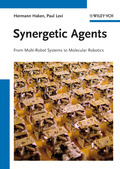Synergetic Agents
From Multi-Robot Systems to Molecular Robotics

1. Auflage September 2012
LIV, 284 Seiten, Hardcover
73 Abbildungen (19 Farbabbildungen)
Monographie
Kurzbeschreibung
Für Leser, die sich mit den Grundlagen und theoretischen Werkzeugen für das faszinierende Gebiet der synergetischen Agenten vertraut machen wollen. Das Buch behandelt sowohl Multi-Roboter-Systeme als auch molekulare Robotik aus einheitlicher Sicht.
Für Leser, die sich mit den Grundlagen und theoretischen Werkzeugen für das faszinierende Gebiet der synergetischen Agenten vertraut machen wollen. Basierend auf dem Konzept von Informations-Minimierung, behandelt das Buch sowohl Multi-Roboter-Systeme als auch molekulare Robotik aus einheitlicher Sicht.
Aus dem Inhalt:
Teil I: Klassische synergetische Agenten
1. Auf der Suche nach allgemeinen Grundsätzen 2. Multi-Roboter-Aktion I 3. Multi-Roboter-Aktion II: Erweiterte Konfigurationen
Teil II: Quantensynergetische Agenten
4. Molekulare Robotik und Quantenfeldtheorie 5. Die Quantentheorie der Roboter-Bewegung und chemische Wechselwirkungen 6. Anwendungen auf molekulare Prozesse 7. Molekularer Transport entlang eindimensionaler periodischer Strukturen 8. Ein Thema in Quantenbiologie 9. Quanteninformation 10. Molekulare Roboter
Anhang:
Die Bedeutung der Erwartungswerte und Korrelationsfunktionen von Bose- und Fermi-Operatoren
Part I: Classical synergetic agents
1. In search for general principles
2. Multi-robot action I
3. Multi-robot action II: Extended configurations
Part II: Quantum synergetic agents
4. Molecular robotics and quantum field theory
5. Quantum theory of robotic motion and chemical interactions
6. Applications to molecular processes
7. Molecular transport along one-dimensional periodic structures
8. A topic in quantum biology
9. Quantum information
10. Molecular robots
Appendix: The meaning of expectation values and correlation functions of Bose and Fermi operators
References
Paul Levi is Full Professor for Informatics in the Institute for Parallel and Distributed Systems of the University of Stuttgart, Germany. He graduated in physics and computer science and became a senior research scientist in informatics and robotics, and Head of the Department of Technical Expert Systems and Robotics at the University of Karlsruhe. In 1988 he was appointed Professor at the Technical University of Munich, and scientific member of the Bavarian Center for Knowledge-Based Systems. Later on he served as Director of the Institute for Parallel and Distributed High Performance Computers at the University of Stuttgart. He is Member of the Management Board of the Centre for Computer Science (FZI) and Director of the Division Intelligent Systems and Production Engineering (ISPE), Karlsruhe, Germany.
Paul Levi's main research fields include computer vision, robotics, distributed AI and multi-agent systems. He has authored and co-authored both textbooks and monographs.


